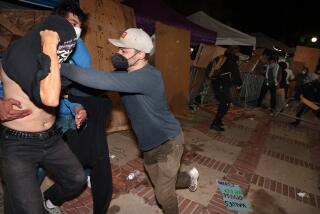Grand Jury: It’s Stress Squared for Dispatchers
Orange County emergency dispatcher Kent Dulyanai won’t soon forget the day he heard a murder in progress over the phone.
He was on duty at the Orange County Sheriff’s Emergency Communication Bureau when a hysterical woman called, saying a gunman had forced his way into her house. He heard a shot and a woman’s scream before the line went dead.
The incident shook Dulyanai--especially because he couldn’t immediately find out what had happened to her. He was upset and needed a break, but the three other dispatchers on duty were flooded with phone calls. No one could take his place. He continued working without a break for about the next five hours, when he finally learned the caller was uninjured but that another woman had been shot to death.
Dispatchers have notoriously stressful jobs. But a new Orange County Grand Jury report says the strain at the Sheriff’s Department center is worsened by understaffing that frequently requires dispatchers to work overtime and leaves them with little flexibility in their schedules.
To ease the strain, the grand jury recommended that the department hire six new dispatchers, allow workers to take scheduled breaks and train staff to become peer counselors. The changes would actually save the department $240,000, according to the report, because of reduced overtime.
“They’re doing something that not everyone can do, and it’s important we address these problems,” said jury Foreman Bruce Johnson.
Despite the pressure, the 35 Orange County dispatchers are doing remarkably well, the panel concluded. “One thing they have is esprit de corps,” said Johnson.
Adding more staff is important because the number of calls into the center is expected to jump 10% to roughly 880,000 by 2001, according to the report.
The grand jury’s nine-month investigation found that dispatchers frequently work 16-hour shifts. They don’t get lunch breaks and must eat at their desks. When a dispatchers handle a traumatic event, no one on staff is trained to help them deal with the emotional impact, according to the grand jury.
Lt. Richard Paddock, who has run the dispatch operation for five years, agreed that his bureau needs help. Although he can provide counseling for his workers a day after a traumatic event, he doesn’t have the staffing to help them at the most critical time: right after the call.
“I don’t have enough people,” said Paddock. “Every year since I’ve been here, it’s been like this.” Paddock has requested more dispatchers but said he was denied. As a result, the county pays significant amounts of overtime for dispatchers, he said.
Sheriff’s Capt. Joe Davis, who supervises the dispatchers’ bureau, said budgets have been tight for some years. “Since the [1994 county] bankruptcy, it’s been difficult for any county department to add staff,” he said. “It’s not like we were treated any different or any worse than others; it just wasn’t possible.”
Paddock and his dispatchers welcome the grand jury findings. During a typical emergency call, Dulyanai and other dispatchers must coax information from panicked callers while telling police where to go and what to expect when they arrive at the scene.
Meanwhile, the dispatchers watch up to five monitors, typing all incoming information into a computer. Often, when there is a car accident or a report of gunshots, four dispatchers can receive 20 calls simultaneously.
“Sometimes you go home and you don’t want to make decisions at all,” said Dulyanai. “It could be something as simple as what you want for dinner. You make decisions all day. It wears you down.”
Brian Stanley, another dispatcher, said he still remembers every detail of his first big call. It came at 12:51 in the afternoon. A woman said, “I shot my son.”
“You just shot your son?” Stanley asked. “How old is he?”
“Nine months old,” she replied and hung up. He traced the call and sent police and ambulances to her Laguna Niguel home but didn’t know what had happened to the baby until he watched the news that night. The baby had died in surgery.
“I played the call over and over in my mind,” he said. “I know it’s silly, but I felt I could have done more.” Alone that night, Stanley cried, read a book and went to bed.
Since then, he’s known happier endings. There are missing kids he reunited with parents and criminals he persuaded to confess. Stanley finds it harder to remember details about those stories, though. “It’s the awful ones that tend to stick with you,” he said.
More to Read
Start your day right
Sign up for Essential California for news, features and recommendations from the L.A. Times and beyond in your inbox six days a week.
You may occasionally receive promotional content from the Los Angeles Times.






